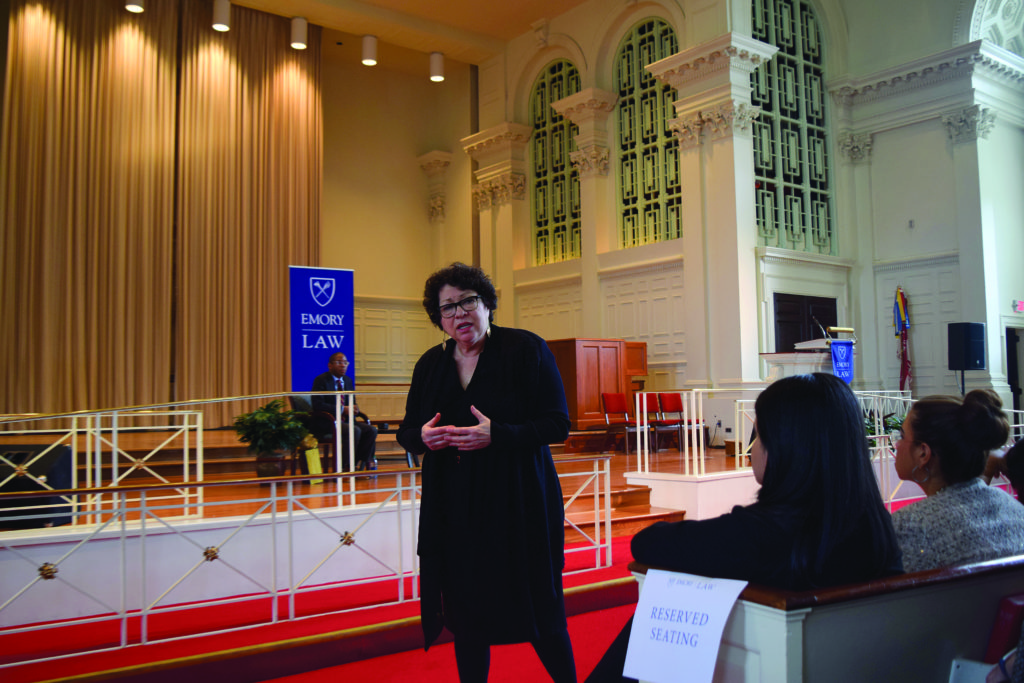U.S. Supreme Court Associate Justice Sonia Sotomayor said that she has never felt like she has “completely belonged,” pointing to the need for diversity on the Supreme Court in her Tuesday afternoon talk at the Glenn Memorial Auditorium.
Sotomayor, the first Hispanic justice to serve on the Supreme Court, answered questions from Associate Professor of Law Fred Smith Jr. and three Emory Law School students in front of an audience of about 1,000 Emory School of Law students, alumni and faculty members.
“When people walk into a system and [they] don’t see anybody who looks like [them], it undermines confidence in that system,” Sotomayor said, adding that diversity can refer to life experience, gender and race. “Every justice comes from an Ivy League school — that affects our policy choices.”
Conversations, Sotomayor said, are richer and broader when people of different backgrounds participate. She pointed to the 2009 case Safford Unified School District v. Redding, in which the Supreme Court ruled a 13-year-old girl was unconstitutionally strip searched on the basis of hearsay. Some of the male justices’ questions suggested that the search was similar to boys undressing in a locker room.
“[Supreme Court Associate] Justice [Ruth Bader] Ginsburg was reputed to have said, ‘I don’t think my colleagues understand what it feels like to be a 13-year-old girl who wants to protect the integrity of her body,’” Sotomayor said. “She was right: If you have not experienced the pain, you may not know how deep it runs.”
Sotomayor also bemoaned the lack of specialized areas of legal expertise among the Supreme Court justices.
“No justice on the court has had direct experience with immigration law, environmental law, and no other justice except Justice [Anthony] Kennedy has done criminal defense law,” Sotomayor said. “There is a lack of experience represented in our court.”
Sotomayor reflected upon her experience as a minority navigating Princeton University (N.J.) and how that allowed her to later ascend to the Supreme Court. The first person in her family to attend college, Sotomayor said she sometimes felt ostracized because of her identity.
“The first four years of Princeton felt like I didn’t belong, and not fitting in has followed me to the Supreme Court,” Sotomayor said. “What I have to remind myself every day is I may not belong 100 percent, but I’m here. They have to deal with me.”
Sotomayor also advised students to use their ethnicity and culture “as an anchor” to keep them grounded, not as a “wall.”
The Barack Obama-appointed justice added levity to her discussion, reminiscing about the first case she heard on the nation’s highest court.
“Oh, my first case?” Sotomayor asked. “It was a little [one], not very important: Citizens United [v. FEC].”
The justice concluded her discussion by emphasizing the importance of reading the Supreme Court’s decisions, where the justices’ reasoning is explained.
“We explain our decisions in the hope that despite the pain [of the decision], people will understand what our thinking was,” Sotomayor said. “Most people react to our outcomes, [but] very few people spend the time and energy to actually read what we write and actually think about the debate. Next time you don’t like something the Supreme Court has done, read it first.”
The Supreme Court delayed a case Thursday concerning the constitutionality of North Carolina’s redrawn congressional districts, in which Sotomayor and Ginsburg dissented.
Ashley Payne (13L) told the Wheel that she appreciated how the justice tied her personal experiences to the importance of representation on the bench.
“Her presence and the power of her story reminded me of the importance of ensuring that the players in our legal system represent as much diversity as is possible,” Payne wrote in a Feb. 6 email to the Wheel. “That said, diversity cannot be limited to gender or ethnicity but must also include an array of diverse life experiences, religions and so on.”
Evvie Walker (19L) wrote that Sotomayor’s talk reaffirmed Walker’s resolve to pursue her legal studies.
“There are days in law school where all of your goals seem absolutely impossible to reach but hearing her speak today reminded me that although this work is challenging, it is work worth doing,” Walker wrote in a Feb. 6 email to the Wheel.
Former Editor-in-Chief | Madison Bober (20C) is from Hollywood, Florida. She majored in political science and minored in women’s, gender and sexuality studies.



